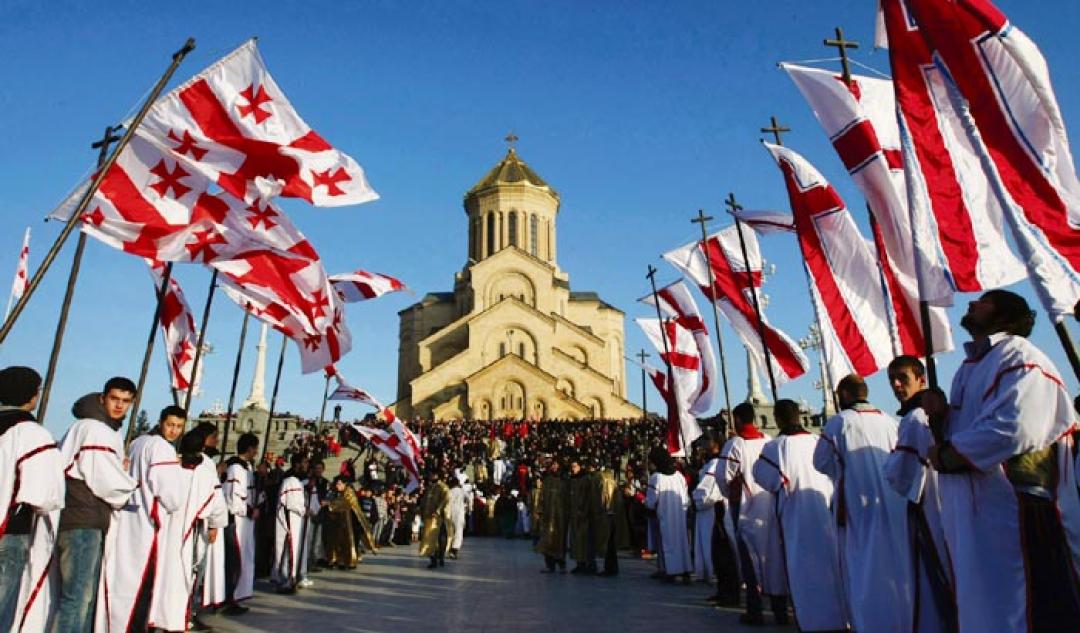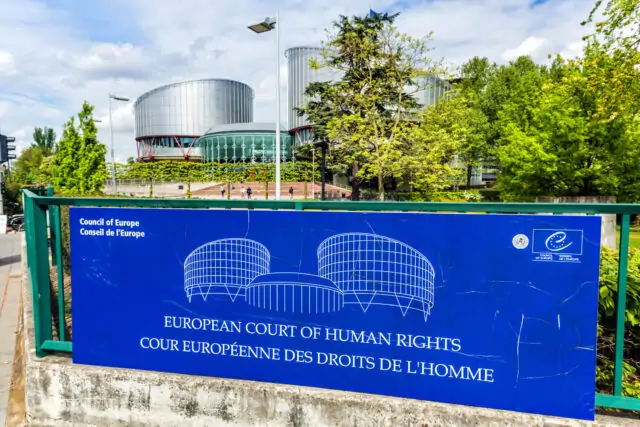
Georgian Dream Proposes Orthodox Christianity as State Religion in Ploy to Retain Power
Georgian Dream Proposes Orthodox Christianity as State Religion in Ploy to Retain Power
Executive Summary:
- The ruling Georgian Dream has proposed that if it wins the upcoming elections, it would declare Orthodox Christianity as the state religion in Georgia. The move looks to gain the support of the Georgian Orthodox Church, one of the most influential institutions in the country.
- The sudden proposal, however, may become a pretext for deepening the Georgian Patriarchate’s mistrust of the ruling elite, as the church has expressed skepticism over the prospective policy.
- Georgian Dream’s tendency toward authoritarianism has given rise to suspicions that it will take complete control of the church following the elections if the party wins.
On August 27, the ruling Georgian Dream party proposed strengthening the constitutional status of the Georgian Orthodox Church and declaring Orthodox Christianity as the state religion (Formula News, August 27; OC-Media, August 28). According to the current constitution, Georgia is a secular state, though Orthodoxy is the country’s largest and historically dominant religion. The constitution states, “The State shall recognize the outstanding role of the Apostolic Autocephalous Orthodox Church of Georgia in the history of Georgia and its independence from the State” (The Constitution of Georgia, accessed September 4). Georgian Dream has been conducting behind-the-scenes consultations with the Patriarchate, the administrative body of the Georgian Church, about the declaration of Orthodox Christianity as the state religion. The church, however, has expressed skepticism over the proposal. Giorgi Zviadadze, the official representative of the Patriarchate, stated that the declaration of Orthodoxy as the state religion is connected with “a process of mutual subordination, which is unacceptable for the church” (TV Pirveli, August 28). With this proposal, Georgian Dream aims to gain favor and increased support from the church for the upcoming parliamentary elections in October. Over 80 percent of the Georgian population identify as Orthodox Christians, and, by showing state support for the church, Georgian Dream hopes to sway the Georgian population in its favor, though the proposal may end up backfiring on the ruling party.
Georgian Dream and the Georgian Orthodox Church have acted in sync in recent years. The Patriarchate has refrained from publicly criticizing any of the ruling party’s decisions, and the highest officials of the Georgian Church have almost always enthusiastically supported the party’s anti-Western rhetoric (Facebook.com/sazupatriarchate, April 26; Eurasianet, May 2). This sudden and ambiguous proposal from Georgian Dream to change the status of the church and the entire state, however, may become a pretext for inflaming the Patriarchate’s mistrust of the ruling elite.
The designation of Orthodoxy as the state religion of Georgia has never been in the interests of the church or the Patriarchate itself. This discussion has been going on in Georgia since the 1990s. Many years ago, the Georgian Patriarchate carefully studied the example of Greece, where Orthodoxy is the state religion. It considered the level of governmental control over church activities unacceptable for Georgia, pointing to how neither the Archbishop nor Bishop of Greece are appointed by the church but rather by the state and how the state determines the church’s budget, exerting full control over the institution (Civil.ge, August 28). In 2002, a constitutional agreement between the state and the church was approved in Georgia. According to the agreement, the state recognized the special historical role of the Orthodox Church in Georgia, although the church continued to exist autonomously from the state (see EDM, April 15, 2013; Orthodoxy.ge, accessed September 5). The Georgian Church felt quite comfortable under the terms of this agreement. On the one hand, this agreement has guaranteed the church significant subsidies from the Georgian state budget for many years, as well as many other privileges. On the other hand, it has limited state interference in church affairs.
Georgian Dream’s tendency toward authoritarianism has given rise to suspicions that it will take complete control of the church following the elections. Mikheil Saakashvili, former president and leader of Georgia’s largest opposition party, the United National Movement, assessed this proposal as Georgia’s informal leader, Bidzina Ivanishvili, aiming to destroy an institution that remains outside government control. According to Saakashvili, such a decision will allow the state to appoint and dismiss patriarchs and bishops, and the Holy Communion will be under the control of the country’s security services (Facebook.com/SaakashviliMikheil, August 28).
This proposal is just the latest example of Georgian Dream’s authoritarian bent. Earlier this year, Georgia’s ruling elite passed the Russian-style “foreign agents” law aimed at restricting the activities of the media and non-governmental organizations. Furthermore, in July, the Georgian Dream government passed the first reading of an anti-LGBT legislative package restricting the rights of sexual minorities (see EDM, April 9, 24, May 1, 13, July 3). More recently, on August 21, speaking at the opening of the ruling party’s election campaign, Ivanishvili made a public promise to his supporters that after winning the parliamentary elections, all influential opposition parties would be banned (Facebook.com/GeorgianDreamOfficial, August 21).
Against this backdrop, some observers perceive the initiative to increase the church’s role in the state as another step toward strengthening authoritarianism in Georgia. Archbishop Zenon Iarajuli, one of the most influential officials in the Georgian Orthodox Church, says that Georgian Dream’s intention to declare Orthodoxy as the state religion is “an insidious plan for the institutional destruction of the church and the rollback of the state from democratic governance” (Mtavari.tv, August 28). The archbishop also claimed that the initiative may come from unspecified players—most likely meaning Russia—hostile to Georgia and the church.
Due to the church’s reaction, Georgian Dream was forced to adjust its intentions regarding the declaration of Orthodoxy as a state religion to avoid angering the Patriarchate. On September 1, Zviadadze confirmed that the state and the church agreed that instead of a declaration on state religion following the elections, a new entry would appear in the constitution stating that “Orthodox Christianity is the pillar of the identity of the Georgian state” (Interpressnews.ge, September 1). This compromise, however, still allows the state to speculate on religious issues during the election period.
The goal of the ruling elite’s initiative is to emphasize the special role of the Orthodox Church not only in the history of Georgia but also in the modern era. On August 31, Ivanishvili stated, “The attacks on the Orthodox Church do not stop, the purpose of which is to shake the identity of Georgia” (Facebook.com/GeorgianDreamOfficial, August 31). Georgian Dream is trying to deceive voters that without a constitutional majority in the future, the party will be unable to make amendments to the constitution and will thus be deprived of the opportunity to protect the church. The “Lelo” opposition party has countered such rhetoric and expressed its readiness to make a new entry in the constitution to strengthen the status of the church before the upcoming parliamentary elections, thereby depriving the ruling elite of the opportunity to manipulate the issue for political gain (Netgazeti.ge, September 1).
Georgian Dream has regularly speculated on religious issues during its time in power. However, in the run-up to the October parliamentary elections, the rhetoric about protecting the Orthodox Christianity and the Georgian Church has reached its peak. When symbolically opening the election campaign from the ancient capital of Georgia, Mtskheta, instead of reporting on Georgian Dream’s socio-economic successes, Ivanishvili acted as the main defender of Orthodoxy. In 2012, the billionaire had promised the population that he would distribute 5 million Georgian lari to each village. This time around, he is promising that Georgian Dream will protect Orthodox Christian values (YouTube, February 19, 2014; Civil.ge, August 21). Georgian Dream’s maneuvering to strengthen the role of Orthodox Christianity in the country’s constitution reveals the party’s broader strategy to consolidate political power by leveraging religious and cultural identity, further deepening concerns about creeping authoritarianism in Georgia and its impact on the country’s democratic institutions.


